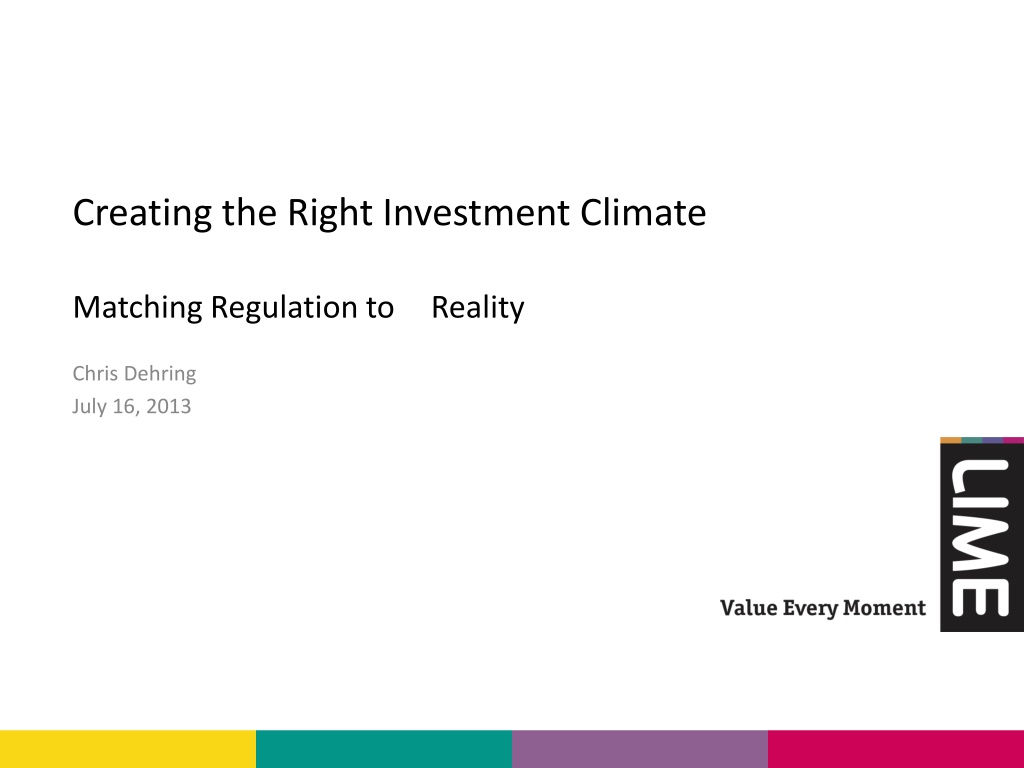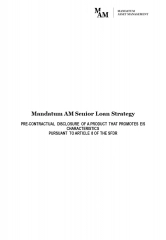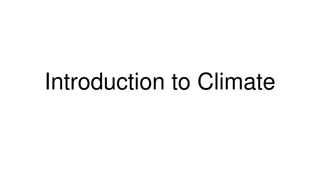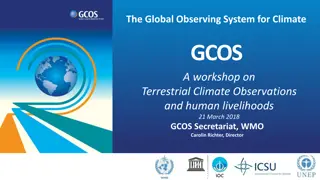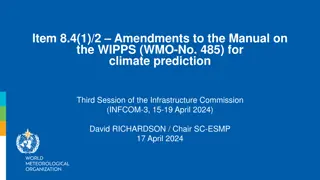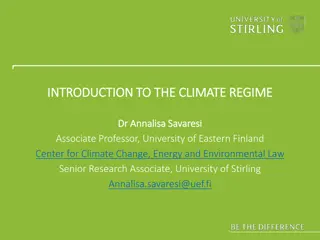Creating the Right Investment Climate
Reviewing regulatory frameworks in the Caribbean to align with market realities, focusing on the impact of Mobile Termination Rates (MTRs), how misalignment can undermine competition, and the success story of Jamaica in realigning regulations. Insights into the results of regulatory adjustments on mobile calling rates and competition.
Download Presentation

Please find below an Image/Link to download the presentation.
The content on the website is provided AS IS for your information and personal use only. It may not be sold, licensed, or shared on other websites without obtaining consent from the author.If you encounter any issues during the download, it is possible that the publisher has removed the file from their server.
You are allowed to download the files provided on this website for personal or commercial use, subject to the condition that they are used lawfully. All files are the property of their respective owners.
The content on the website is provided AS IS for your information and personal use only. It may not be sold, licensed, or shared on other websites without obtaining consent from the author.
E N D
Presentation Transcript
Creating the Right Investment Climate Matching Regulation to Reality Chris Dehring July 16, 2013
Summary o Regulators need to review regulatory framework to align with market realities. o For most Caribbean countries, the regulatory framework was designed 10 years ago and has not kept pace with market changes. o Misalignment damages competition and discourages investment. o Investment encouraged with evidence based alignment. o The recent experience of Jamaican MTRs is salutory.
What are Mobile Termination Rates (MTRs) o Rates that Mobile Operators charge other operators to send a call to a customer on their network. That is the rate to terminate the call on their network. o Input into retail rate charged to the customer in the Calling Party Pay (CPP) regime which dominates in the Caribbean. o Each provider dominant on its own network for termination of call. No alternative to reach customer but to terminate on that network. o Rates therefore set by regulators based on costs to provide the termination service.
Misalignment undermined competition in Jamaica o Regulatory framework set in early years to support transition from monopoly to competition. Right in the early years but the market evolved. o MTRs remained high in Jamaica for many years at US$0.094 (average rate J$8.42). o Result was: Fixed network effectively subsidized the mobile network. Less and less revenues to reinvest in network. Creation and reinforcement of a dominant but unregulated provider. Other providers unable to compete. Claro exits market. Policymakers failed to recognize that misaligned regulatory environment was threatening the very viability of competition in Jamaica.
Jamaica fixed it o Evidence based policymaking prevailed. o Telecommunications Act 2000 amended 2012. Strengthened power of OUR to set interim wholesale and retail rates. o Interim MTR of J$5.00 (US$0.05) per minute effective 15 July 2012. Approximately 50% reduction. o Final MTR of J$1.10 (US$0.01) per minute effective 1 July 2013 for five (5) years. 80% decrease on interim rate.
The Results o Customers now enjoy historic low mobile calling rates in Jamaica. o LIME s J$2.99 per second default plan any network, anytime and frequently called overseas markets. o 64% plunge in retail rates. o Market more competitive other providers forced to improve prices and services to customers. o Yet one issue remains to be resolved cross-net calling rates.
Learning from Jamaican experience MTR (USD) ECTEL Average 0.093 BVI 0.05 Anguilla 0.037 Cayman 0.035 Jamaica 0.01
The Situation in ECTEL o ECTEL obliged by statute to keep MTRs cost-oriented. o Current MTRs based on cost data that is 6-7 years out of date. o Regional benchmarks use more recent cost data and show lower MTRs. o ECTEL has not accepted there is misalignment and has no known plans to review cost-orientation. o Heed the example of Jamaica
Summary o Regulators need to review regulatory framework to align with market realities. o For most Caribbean countries, the regulatory framework was designed 10 years ago and has not kept pace with market changes. o Misalignment damages competition and discourages investment. o Investment encouraged with evidence based alignment. o The recent experience of Jamaican MTRs is salutory.
